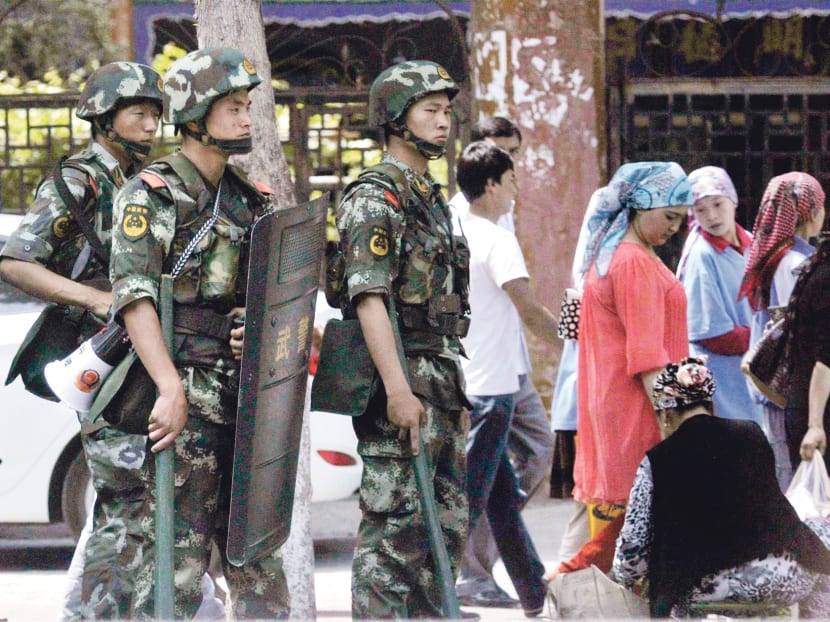To quell unrest, Xinjiang offers cash for mixed marriages
BEIJING — The Chinese authorities in the restive western region of Xinjiang have begun offering large cash incentives for interracial marriages in the latest attempt to quell growing unrest among the mainly Muslim Uighur ethnic group that inhabit the region.

Armed police officers near the grand bazaar in Urumqi. Security services in Xinjiang have stepped up arrests of alleged terrorists, but
local governments have also experimented with economic incentives to
address resentment. Photo: REUTERS
BEIJING — The Chinese authorities in the restive western region of Xinjiang have begun offering large cash incentives for interracial marriages in the latest attempt to quell growing unrest among the mainly Muslim Uighur ethnic group that inhabit the region.
The policy, celebrated by CommunistParty officials as advancing the “great cause of assimilation” and “ethnic unity”, offers those entering mixed marriages an annual bonus of 10,000 yuan (S$2,040), equivalent to 135 per cent of average rural incomes a year.
Uighurs, Mongolians and other ethnic minorities who marry people from the dominant Han race, which makes up more than 90 per cent of China’s 1.36 billion population, will alsobe eligible for a broad range of medical, education and housing benefits.
The policy has been introduced in sparsely populated Cherchen county in southern Xinjiang as part of the government’s response to a wave of bombings and terrorist attacks in the region, said local officials and an announcement from the local government.
“Cherchen county has a lot of minorities with their own religious beliefs but, through Han minority mixed marriages, we can strengthen ethnic unity,” an official from the county’s propaganda office told the Financial Times.
In the wake of terrorist attacks across China, most of them in Xinjiang, Beijing has vowed to crush Uighur “separatists” and “religious extremists”. In the latest serious incident, 96 people were killed in riots near Kashgar in July after a “gang” of Uighurs attacked a police station and government offices, said state media.
Security services in the region have stepped up arrests and executions of alleged terrorists in recent months, but some local governments have also experimented with economic incentives to address resentment.
“The central government has recently been calling for greater inter-ethnic ‘mingling’ in Xinjiang and these latest policies (in Cherchen) appear to be a response to that,” said Dr James Leibold, an expert on China’s ethnic policy at La Trobe University.
Similar cash incentives have been offered in Tibetan regions, where resentment towards heavy-handed Chinese rule has also been rising.
The government has long been concerned about the low rate of interracial marriages between Uighurs and Han, which it sees as an obstacle to solidifying Chinese rule in the vast border territory.
In 2000, the last year the government published official figures, only 1.05 per cent of Uighurs lived in mixed-race families, lower than 7.71 per cent for Tibetans and the national average of 3.2 per cent, said Mr Leibold.
Under the new policy in Cherchen, couples in mixed marriages will be eligible for up to 20,000 yuan in medical expenses paid by the state, while their children will receive up to 5,000 yuan a year once they are accepted to study at a Chinese school. That is in addition to the 10,000 yuan annual bonus they can receive for up to five years.
The average annual income for rural residents in Xinjiang last year was only 7,394 yuan. The Financial Times





